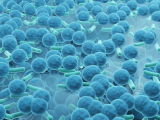Mar 15, 2011
Group appeals Livermore Lab's BSL-3 status
A watchdog group on Mar 11 appealed a court ruling that Lawrence Livermore National Laboratory in Livermore, Calif., can study deadly pathogens such as those that cause anthrax and plague. The group, Tri-Valley CAREs, filed an appeal with the Ninth Circuit Court of Appeals, challenging a September ruling of the US District Court in Oakland that permitted the Department of Energy (DOE) to proceed with biosafety level-3 (BSL-3) research at the Livermore lab, according to a report in The Oakland Tribune. Tri-Valley CAREs, which describes the work as "biowarfare research," according to the story, is asking the court to require a comprehensive environmental assessment. Tri-Valley CAREs attorney Scott Yundt said the DOE's own study of the lab's security "acknowledged potentially great consequences of [a terrorist] act if it were to occur, but failed to analyze those consequences." Livermore public information officer Steve Wampler responded, "This is probably one of the best-protected BSL-3 facilities in the country. We have protective service officers, we have fences, we have limited access to the building to only a few people."
Mar 12 Oakland Tribune story
Vector-based norovirus vaccine looks promising in mouse study
Researchers from Ohio State University have developed a vector-based technique for producing a norovirus vaccine, which generated a strong immune response in mice, according to a Eurekalert press release today. Their findings appear in the March issue of the Journal of Virology. The vector for the vaccine is vesicular stomatitis virus (VSV), into which researchers insert the gene for the capsid, or outer shell, of the human norovirus. The recombinant vector virus serves as both the vaccine delivery vehicle and the agent that produces virus-like particles (VLP) that mimic human norovirus, according to the press release. Dr Jianrong Li, assistant professor of food science and technology at Ohio State and senior author of the study, said in the release, "The virus-like particles can be continually produced in animals or humans for several weeks and stimulate strong immune responses. That's the advantage of using VSV." Developing a vaccine against norovirus is challenging, because it can't be grown in cell cultures. In the study, the group compared the VSV-vector vaccine with one containing a baculovirus-expressed VLP. Mice that received the VSV vaccine had stronger humoral and cellular immune responses. The US Centers for Disease Control and Prevention (CDC) estimates that norovirus causes 21 million gastric illnesses each year in the United States, but so far there is no specific vaccine or treatment. Another norovirus vaccine, made by Ligocyte of Vancouver, B.C., is in early clinical trials. The company is testing inhaled and intramuscular versions of its VLP norovirus vaccine.
Mar 15 Eurekalert press release
Mar J Virol abstract
Oct 28, 2010, CIDRAP News story



















